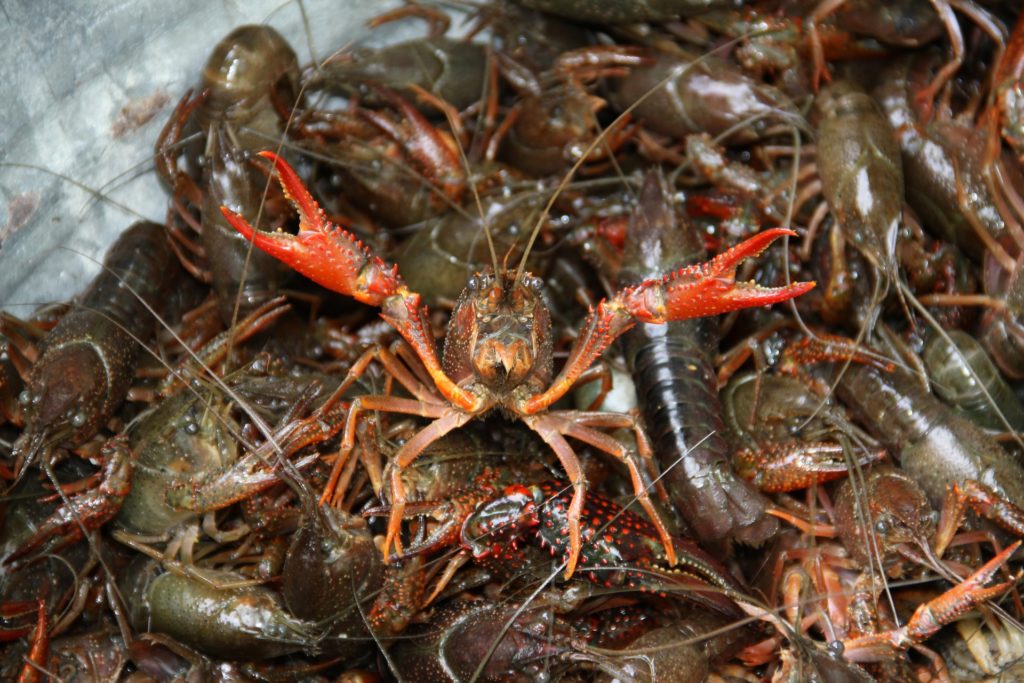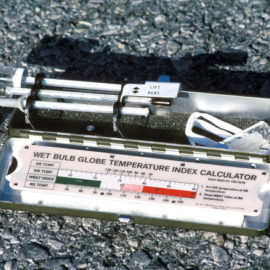
Storms are stronger. Winters are hotter. Crawfish are leaving. LSU now has a grant to link these three and, hopefully find a solution.
Stronger hurricanes, hot winters and unusual crawfish behavior that’s driving the crustacean’s mass emigration from Louisiana’s coast. A team of three researchers and professors at Louisiana State University suspected those trends might be linked to a changing climate. And now, thanks to a $5.4 million federal grant, they aim to find out. The National Oceanic and Atmospheric Administration, NOAA, is giving LSU and three other Gulf Coast research organizations the money over five years as part of the Southern Climate Impact Planning Program. This is the program’s fourth phase of funding, as these four entities have worked to plan and mitigate weather impacts since 2008, when they developed what experts bill as the world’s most comprehensive storm surge database called SURGEDAT. State climatologist and professor Barry Keim and his team of researchers track extreme rainfall events across Texas, Oklahoma, Arkansas, Louisiana and Mississippi in hopes of identifying factors that contribute to the storms’ intensity and frequency. “For the past 13 years, we have been producing research, tools and knowledge that reduce weather and climate risks now and in the future,” Keim said. “NOAA’s continued support of this work validates its importance, especially now as extreme weather events, flooding and wildfires threaten critical infrastructure and our livelihood across the country.”
theadvocate.com
This is a wide ranging study with wide ranging contacts to get the data needed.
Along with tracking storms, the researchers work with the Louisiana Department of Health to monitor temperature factors that lead to heat-related hospitalizations and winter freezes that affect coastal ecology. “This project has a human focus,” Keim said. “We’re trying to figure out what brings people into emergency rooms in the summer, how humidity and temperature combine to send people to hospitals.” Keim said there is a dramatic decrease in the number of days when temperatures are below freezing in the Southern states, which poses issues for plants and animals that depend on temperature-driven cycles to survive. “Maximum temperatures are staying the same, but we’re seeing fewer and fewer cold days, which can be dangerous to the region’s ecology,” he said.
While focused on the South, this is a study that can be applied nationwide.
Vincent Brown, LSU professor and climate research director, said the team’s research can have tangible impacts on lives both in the South and nationwide. After studying eight years of crawfish harvest data, the researchers discovered how weather events stall harvests. He said freezing temperatures, heavy rainfall, fog and a weather-related virus threaten the survival of crawfish ponds. “As 90% of crawfish sold nationwide is harvested in Louisiana, it’s alarming when crawfish farmers are seeing this huge variability in their harvests,” Brown said. “If we can figure out a way to mitigate some of these issues, we can have a huge impact on the state’s crawfish industry.”
A number of posts have been on the topic of migration both to southern Louisiana but also to levee protected areas.
The new phase of funding will also support research on how people have migrated from Louisiana’s coast because of hurricanes, flooding and other extreme weather events. “Louisiana is the only state losing population along its coast,” Keim said. “Frequent hurricanes, flooding, sea-level rise and coastal land loss all give people good reasons to move inland.” Through studying hundreds of years of storm data, the team can determine how to build infrastructure that curbs the impact of intense storms, and Keim said Louisiana is the best place to start. “With the Gulf of Mexico directly South of us, Louisiana is on the front lines of many extreme weather events,” he said. “It’s great to be able to study the issues up close, to see the impacts in real time.”
More funds are being allocated to studying climate change now and so there is more research being done.
He said the Biden administration is allocating more funds to climate change research than administrations past, allowing he and Brown the resources to conduct studies. NOAA gave the two men an additional $300,000 over two years to study flooding in New Orleans. “It’s always been my passion to do climate research and ‘climate’ is now a buzzword,” Brown said. “We want people to have a better understanding of what climate and climate resiliency means to them. The information we are collecting can change people’s lives and benefit all of us.”
A lot of research on needed questions if we are to be able to continue living here. This past week has shown the hotter winters!



